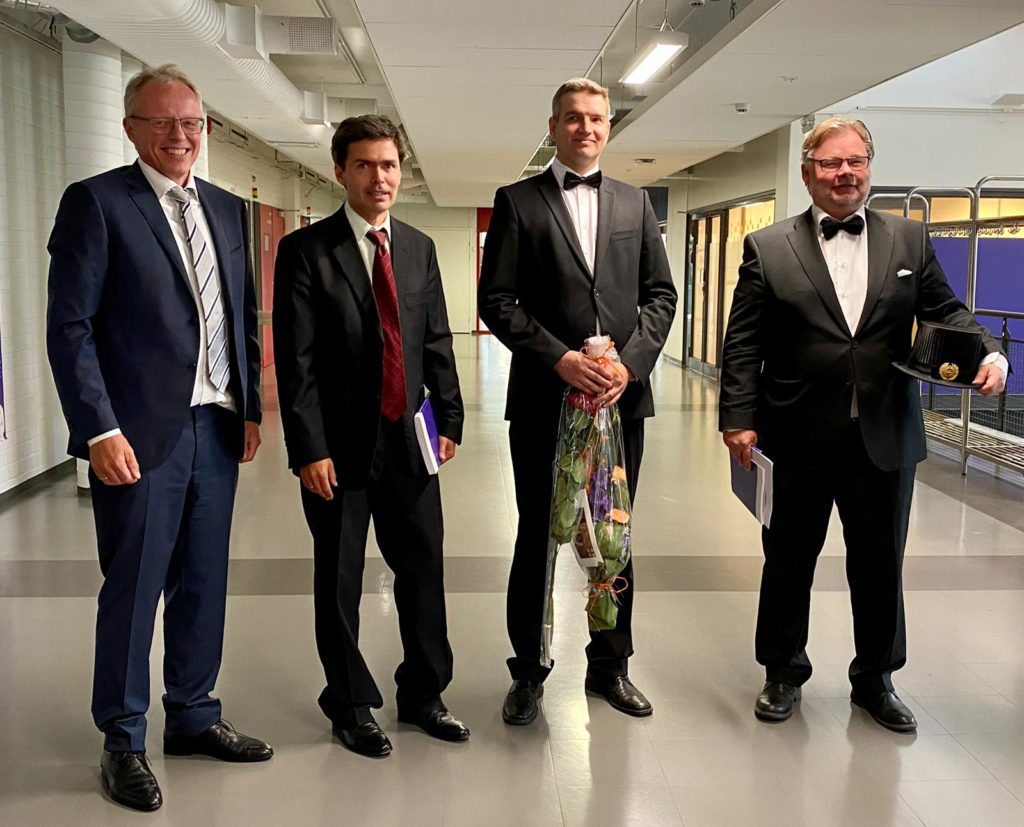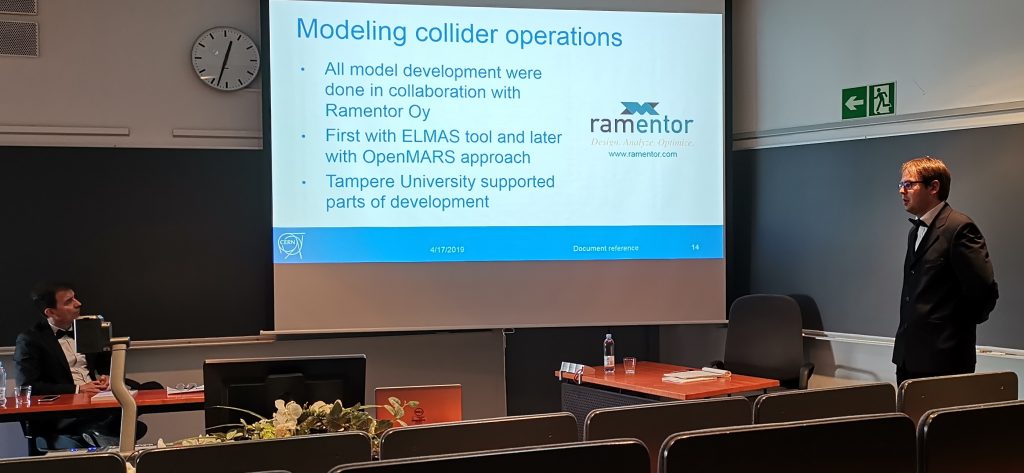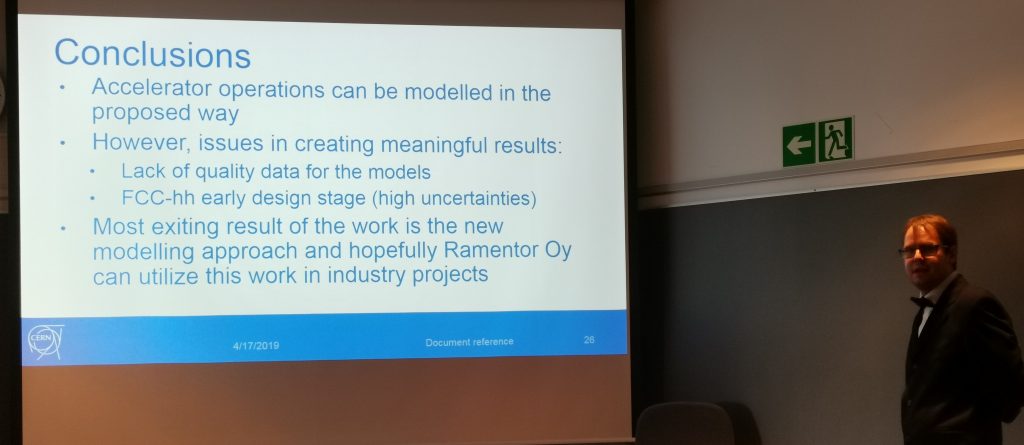An open modelling approach for availability and reliability of systems

With the acquisition of Ramentor, AFRY further strengthens its digitalization capabilities and advances RAMS offering for clients. By using RAMS, AFRY can help clients make more informed decisions, optimize their risk level and overall life-cycle costs and support them in their digital transformation to more sustainable and cost-efficient solutions.
- RAMS engineering and consulting services are foreseen to be increasing in the coming years and are a key part of our energy and industry markets transition strategy. By integrating RAMS to current industry technical design practices we will create a unique differentiator for our services, says Richard Pinnock, Head of Division Energy, AFRY.
- We are excited to be part of AFRY. We have two decades of solid R&D and pragmatic industry project history on dependability management, and the market is clearly maturing now along with digitalization. Together with AFRY we can take our services to the next level by adding a significant global client base and support in future engineering and digitalization, says Timo Lehtinen, Managing Director of Ramentor.
Get to know Ramentor's products, trainings, application services and customer cases.
Afry Newsroom: https://afry.com/en/newsroom/press-releases/afry-acquires-software-and-expertise-company-ramentor-in-finland

Ramentor Oy is one of the company partners in the SMARAGDI consortium, which aim is to develop intelligent solutions for future high-temperature superconducting (HTS) magnets. The public-private consortium advances magnet technology and updates an experimental facility for testing HTS magnets in Tampere, Finland.
Ramentor's research focuses on reliability modelling of magnet manufacturing process and design of condition monitoring. The aim is to develop powerful analysis approaches that are applicable also to various other industry sectors. For complex systems, the combination of advanced modelling solutions and automatized data collection is required to enable calculation of useful analysis results without excessive workload.
"At Ramentor, we are developing modeling tools to analyze the condition monitoring needs in challenging systems. Fast data analysis can improve the machine reliability and increase its efficiency. Ramentor will support the TAU research in condition monitoring,” explains managing director Timo Lehtinen.
Business Finland has granted 1.2 M€ to the SMARAGDI consortium. The total value for the 2-year joint effort of Tampere University (TAU), 3DStep, Teraloop, Ramentor, Meluta, and Luvata is 2 M€. The long-term goal is to put Finland at the forefront of HTS magnet development when the technology fully breaks through to commercial applications.
More information can be found from the project website: https://projects.tuni.fi/smaragdi/
An Object-Oriented Modelling Framework for Probabilistic Risk and Performance Assessment of Complex Systems
Penttinen J-P, Ramentor Oy
Doctoral dissertation
4 September, 2020
"This thesis introduces a modelling framework, which is developed for risk and performance assessment of large and complex systems with dynamic behaviours. The framework supports the most common reliability and operation modelling techniques, and permits their customisation. This ensures a high degree of freedom for the modeller to describe accurately the system without limitations imposed by an individual technique. The use of an object-oriented paradigm increases flexibility and decreases the semantics gap between the model and real world, which are issues with traditional techniques. The framework is named as Analysis of Things (AoT) to emphasise its universal nature and wide application possibilities. The AoT models are defined by using a Triplets data format, which is platform-independent and tabular. A single table declares the applied modelling techniques, creates the model structure, and assigns the parameter values. The format enables straightforward manual model edit while maintaining direct database compatibility. This thesis also documents a calculation engine, which has been developed for analysis of AoT models. The engine compiles dynamically the most efficient simulation algorithm for each modelling technique. A catalogue of built-in techniques is included in this thesis to demonstrate the application of the framework. The configuration of the simulation algorithm is presented for each technique. The AoT model creation is illustrated by using simple example models. Various techniques can be combined to build a comprehensive risk and performance model that systematically includes all essential details. The advanced features of the AoT framework have wide-ranging applications for analysis of reliability, availability, and operational performance of complex industrial products and processes."
URL: http://urn.fi/URN:ISBN:978-952-03-1635-8

The Large Hadron Collider (LHC) in European Organization for Nuclear Research (CERN) is one of the most challenging targets in the world for reliability analysis. Only by using an efficient and flexible modelling technique it is possible to understand all the details affecting the operation. The same powerful approach can be used for increasing the production and energy efficiency of industrial processes.
As a part of the Future Circular Collider (FCC) study, CERN, Tampere University and Ramentor Oy developed a novel reliability modelling approach that is suitable especially for vast and complex analysis targets. The research focused on enabling automatized model creation and on ensuring diverse applicability and sufficient calculation speed. The result of the research was an OpenMARS approach, which was published in a peer-reviewed article.
In his doctoral dissertation M.Sc. (Tech.) Jussi-Pekka Penttinen has developed the OpenMARS approach further to act as a framework for customized reliability, availability and risk analysis tools. The framework supports fast and efficient development of a tool that adapts to the domain-specific needs of the analysis target, automatizes the model creation, and optimizes the calculation speed of analysis results. When compared to traditional tools, the use of a customized tool is significantly more user-friendly and the workload of the analyses can be managed better.
The dissertation is available online at:
http://urn.fi/URN:ISBN:978-952-03-1635-8
Väitöstiedote suomeksi:
https://www.tuni.fi/fi/ajankohtaista/uusi-kayttovarmuuden-mallinnustapa-mukautuu-analysointikohteiden-erityistarpeisiin


In 2014 Ramentor started a co-operation with Tampere University and CERN to research methods and tools for reliability and risk assessment of particle colliders. The research is a part of Future Circular Collider (FCC) study, which develops scenarios for post-Large Hadron Collider (LHC) era. ELMAS was selected as a tool for model the collider systems and to simulate the particle acceleration process. The model enables assessing availability and collision production, which are essential quality attributes of a particle collider.
An ELMAS model of CERN's particle collider was created by M.Sc. (Tech.) Arto Niemi. In his doctoral dissertation “Modeling Future Hadron Colliders’ Availability for Physics” he validates the model against LHC operations and shows preliminary results on the FCC availability and collision production.
Mr Niemi's work for creating the particle accelerator's ELMAS model formed a foundation for a R&D agreement between CERN and Ramentor. The target was to develop an approach that allows combining the most common risk assessment and operation modeling techniques for efficient analysis of complex system with dynamic operation changes. In 2017 the FCC Innovation Award was given to the research. In 2019 Ramentor, Tampere University and CERN published the developed OpenMARS approach in a peer-reviewed article.
The dissertation is available online at http://urn.fi/URN:ISBN:978-952-03-1057-8
Modeling Future Hadron Colliders’ Availability for Physics
Niemi A, CERN
Doctoral dissertation
17 April, 2019
"This thesis presents an availability model for the Future Circular hadron Collider. The thesis validates the model against LHC operations and shows preliminary results on the FCC availability and luminosity production. Ramentor’s ELMAS software was chosen as the platform for the model. ELMAS is designed as a fault tree software. However, the developed model combines fault trees with Markov models. This feature was implemented by adding custom Java code and libraries to models. This reliance on a custom code was not the ideal solution and lead to the development of the OpenMARS approach. This approach allows combining the most common risk assessment and operation modeling techniques and connecting the models made with these techniques. This thesis presents the basic concept of this approach and shows how the collider operations model can bei mplemented with it. The discussion section also provides ideas on how the study would have proceeded if the collaboration with Ramentor Oy had not been an option and further applications of the OpenMARS approach."
URL: http://urn.fi/URN:ISBN:978-952-03-1057-8



An open modelling approach for availability and reliability of systems
Penttinen J-P, Ramentor Oy
Niemi A, Gutleber J, CERN
Koskinen K, Coatanea E, Laitinen J, Tampere University of Technology
Reliability Engineering & System Safety, Volume 183, March 2019, Pages 387-399
26 November, 2018
"This paper introduces an Open Modelling approach for Availability and Reliability of Systems (OpenMARS), which is developed for risk and performance assessment of large and complex systems with dynamic behaviours. The approach allows for combining the most common risk assessment and operation modelling techniques. This ensures a high degree of freedom for the modeller to accurately describe the system without limitations imposed by an individual technique. OpenMARS uses a platform-independent tabular format to define the used modelling technique, to create the model structure, and to assign the parameter values. We developed the format to enable a straightforward manual model definition while maintaining database compatibility. This paper also presents our calculation engine for stochastic simulation-based analysis of OpenMARS models. Our intention is to use this approach as a basis for new software. We demonstrate the feasibility of OpenMARS with an example of a multi-state production process that is subject to failures. The example creates a comprehensive system model by combining interconnected failure logic, operation phase, and production function models. We believe that the advanced features of OpenMARS have wide ranging applications for analysis of reliability, performance, and energy efficiency of complex industrial processes."
URL: https://doi.org/10.1016/j.ress.2018.11.026
Preprint in CERN Document Server: https://cds.cern.ch/record/2649261
Specification in CERN Document Server: https://cds.cern.ch/record/2302387